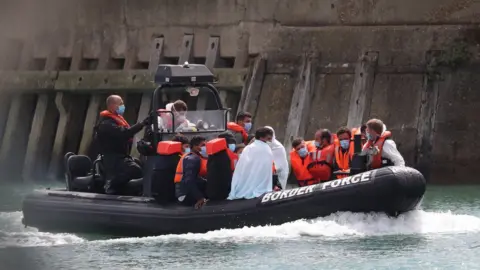What does Rishi Sunak's promise to stop the boats mean?
 PA Media
PA MediaIn his first major speech of 2023, prime minister Rishi Sunak twice pledged to "stop the boats".
Listing five key promises at the beginning and the end of the speech, he said both times: "We will halve inflation, grow the economy, reduce debt, cut waiting lists and stop the boats."
That was "stop the boats", without qualification.
Given that many people in government have recently highlighted what an intractable problem the issue of people crossing the English Channel in small boats is, that seems a rash promise.
Elsewhere in the speech, the prime minister did qualify his fifth promise, saying: "We will pass new laws to stop small boats, making sure that if you come to this country illegally, you are detained and swiftly removed."
But that is a very different pledge. It is easy to pass new laws if you have a majority in Parliament, but much harder to pass laws that will work. It is even harder to enact legislation that will actually stop people smugglers putting desperate people in small boats when it is such a profitable trade. Just look at drugs legislation and how unsuccessful that has been in preventing smuggling.
Bogged down
When she was home secretary, Priti Patel passed a law that would enact her policy of sending some asylum seekers to Rwanda for processing. However, that policy is still bogged down in the courts, and so far no-one has been sent to Rwanda under the scheme.
Also in Ms Patel's Nationality and Borders Act 2022 was a new offence of arriving in the UK illegally, but it has barely been used.
Last year, a record 45,756 people entered the UK after crossing the Channel in small boats.
The issue came to a head in November when the Manston migrant processing centre near Dover became overwhelmed because of the huge numbers who crossed in October, and a lack of hotel rooms for them. Some migrants spent weeks sleeping on the floor and diseases like scabies and diphtheria started to spread.
Other European countries, particularly Germany and France, cope with larger numbers of asylum seekers, but these are much less visible than the shivering migrants being brought ashore in Dover.
So what exactly is the prime minister promising - to "stop the boats" or to "pass new laws to stop small boats"?
He was asked about this afterwards and admitted: "This is not an easy problem to fix and it's not one we can fix overnight, and requires lots of different things to be changed.
"The most important thing we need to do is pass new legislation, and we want to make sure that new legislation means that if you come here illegally to our country you will not be able to stay. You will be detained and swiftly removed back to a safe country or your own home if that is appropriate," he said.
"I just want to make sure that we fix this problem and, having had this job for a few weeks and spent time thinking about it, my belief is that we do need new laws if we want actually to deal with this challenge."
Mr Sunak claimed other initiatives were already making progress: "The new deal with France means that there's 40% more patrols happening in France, which is making a difference to us.
"The new deal with Albania will enable us to return more migrants who have come here from that country back to where they're from. They account for a third of all small boat crossings in the latter part of last year and that can make a really big difference."
Reading the small print
On 13 December, in the House of Commons, Mr Sunak previously promised to reduce the backlog of unprocessed asylum claims and to stop the use of hotels for housing asylum seekers as part of another five-point plan, that time specifically targeted at the small boats crisis.
The government expects to spend £2.3bn on hotels for asylum seekers this financial year (2022-23).
So this is a case of reading the small print. What Mr Sunak actually promised on Wednesday is to pass new laws to detain and remove people entering the UK illegally.
That is not the same as "stopping the boats". What is more, this new legislation may well get bogged down in the courts as a potential breach of the UK's refugee obligations, and if it is going to work it will have to be better than the laws passed only last year.
